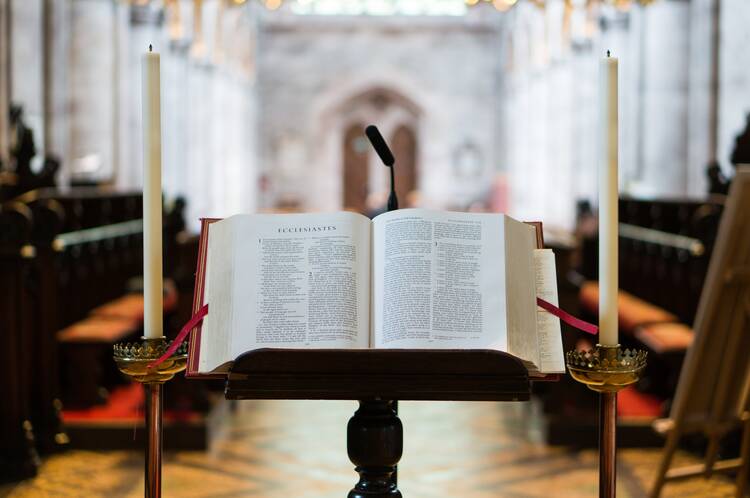The Gospel is meant to be preached. It’s our responsibility to do it.
Today’s Gospel is the end of the story of the walk to Emmaus, and it also recounts Jesus’ first appearance to the remaining 11 apostles. The Gospel offers reactions to the resurrection and insights into what it means to be a witness to Christ. It also sets up the continuation of Luke’s narrative in the Acts of the Apostles.
‘You are witnesses of these things.’ (Lk 24:48)
Did Lent prepare you to celebrate Christ’s resurrection?
What can you do to share the good news with others?
In what ways do you live out your faith in Christ?
Jesus’ resurrection in Luke includes a few unique elements. When Mary Magdalene, Joanna, Mary and other women tell the apostles of their encounter with angels at the empty tomb, the apostles did not believe them, although Peter goes to visit the tomb (Lk 24:6-12). The women also told other followers, including two disciples who encountered Jesus on the way to Emmaus (Lk 24:13-27). Jesus speaks to them as they mourn his death, not fully understanding that he had risen. At the end of the encounter, Jesus breaks bread, which helps them to recognize him (Lk 24:28-32). The beginning of today’s Gospel is the ending of that story, when the disciples share their experience with the 11 apostles.
Following their report, Jesus appears to the apostles, which frightens them. At this point in the narrative, the apostles have heard two different accounts of the resurrection, yet they are still surprised and terrified at the sight of Jesus. Jesus questions their reaction and offers evidence through the stigmata on his hands and feet. Jesus even eats fish with them as another sign that he is physically present with them and not a ghost.
After giving the physical proof, Jesus provides a theological explanation for his suffering, death and resurrection. He teaches the apostles by opening “their minds to understand the Scriptures,” connecting his mission and work with the Old Testament laws, prophets and psalms.
Jesus also proclaims that his suffering, death and resurrection happened for the sake of repentance. In teaching about Scripture, Jesus says to his followers, “Thus it is written that the Christ would suffer and rise from the dead on the third day and that repentance, for the forgiveness of sins, would be preached in his name to all the nations.” Hearing this message during the Easter season should remind us of the beginning of Lent. Ash Wednesday began with a reminder of our mortality and a call to repent from sin. Today’s Gospel reiterates that message, explaining why it is foundational to understanding Jesus’ death and resurrection.
Importantly, the end of Luke is only the halfway point. The Acts of the Apostles builds on Luke’s Gospel, describing the beginning of the Christian movement and its spread to Jews and Gentiles. At the end of the narrative, Jesus commissions the apostles, sending them out to share the good news through the power of the Holy Spirit (Lk 24:49, see Acts 1:8).
In each of the post-resurrection appearances in Luke, something is revealed and then shared with others. The women tell the apostles and disciples about the resurrection. The disciples on the road to Emmaus share their experience of the risen Christ with the apostles. Jesus teaches the apostles the meaning of the resurrection, and they are sent (Gk. apostolos means “one who is sent”) to tell others. These are all examples of what it means to be a Christian witness. It is not simply having faith in Christ’s death and resurrection and understanding its connection to the forgiveness of sins; rather, it is sharing the good news with others.
This article also appeared in print, under the headline “Sharing the Gospel,” in the April 2021, issue.









